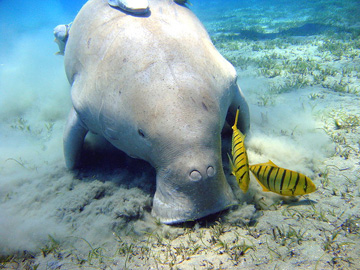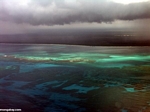Dolphins, whales, and dugongs will be safe from hunting in the waters surrounding the Pacific nation of Palau. At the Convention on Biological Diversity (CBD) in Nagoya, Japan, Palau’s Minister of the Environment, Natural Resources and Tourism, Harry Fritz, announced the establishment of a marine mammal sanctuary covering over 230,000 square miles (600,000 square kilometers) of the nation’s waters, an area the size of Ukraine.
“Palau’s dugongs are the most isolated and endangered population in the world. We also have at least 11 species of cetaceans in our waters, including a breeding population of Sperm Whales and possibly as many as 30 other species of whales and dolphins that utilize our EEZ. This sanctuary will promote sustainable whale-watching tourism, already a growing multi-million dollar global industry, as an economic opportunity for the people of Palau,” Fritz said in Nagoya.
Already, last year Palau declared its waters a sanctuary for sharks. Sharks have been decimated worldwide, with some species’ population plunging by 99 percent, due to bycatch, overconsumption, and the shark-fin trade, whereby caught sharks’ fins are cut off and the animals are thrown back into the water to die.
 The dugong is listed as Vulnerable to extinction by the IUCN Red List. Photo by: Julien Willem. |
Although many populations of whales are rebounding after centuries of commercial whaling, some are still threatened by whaling by Iceland, Japan, and Norway, as well as pollution. Dolphins are often killed as bycatch and suffer from widespread marine pollution.
“Palau, which once supported the Japanese position on commercial whaling, now supports conserving marine mammals, along with sharks and other species. By aiding economic development through ecotourism, Palau recognizes the importance of keeping these species alive and thriving,” Dr. Susan Lieberman, director of international policy for the Pew Environment Group, said in a statement, adding that “we call on other countries large and small to follow Palau’s example.”
Palau made its announcement on the Convention’s Ocean Day where protective measures for the ocean were discussed by representatives. Under the convention nations have pledged to protect 10 percent of ocean waters by 2012, but according to a recent report by the Nature Conservancy only 1.17 percent of marine waters are protected.
Related articles
World needs to protect 32 million square kilometers of ocean in two years
(10/20/2010) According to goals set in 2002 by the Convention on Biological Diversity (CBD) and the World Summit on Sustainable Development, nations must spend the next two years catching-up on creating ocean reserve. Currently, about 1.17 percent of the ocean is under some form of protection, but the 2002 goal was 10 percent by 2012. That means protecting over 32.5 million square kilometers, of the ocean twice the size of Russia. According to a recent report, Global Ocean Protection by the Nature Conservancy, not only is the world failing on its goals to protect a significant portion of the ocean, it’s also failing to protect 10 percent of various marine ecosystems.
In the midst of marine collapse will we save our last ocean?

(07/05/2010) Imagine an ocean untouched by oil spills: a sea free of pollution, invasive species, dead zones, and over-exploitation; waters where marine animals exist in natural abundance and play ecological roles undimmed by mankind. Such a place may sound impossible in today’s largely depleted oceans, but it exists: only discovered in 1841, the Ross Sea spreads over nearly a million kilometers adjacent to the Antarctic continent. Here killer whales, penguins, sea birds, whales, and giant fish all thrive. However, even with its status as the world’s ‘last ocean’, the Ross Sea has not escaped human impact. Over the last 15 years commercial fisheries have begun to catch one of its most important species in the ecosystem to serve them up on the dinner plates of the wealthy.
Sharks swim safe around the Maldives
(03/11/2010) Sharks that dwell in the Maldives can breathe a sigh of relief: the island nation has declared 90,000 square kilometers of the Indian Ocean a safe-haven for sharks, banning shark fishing as well as any trade in shark fins.
